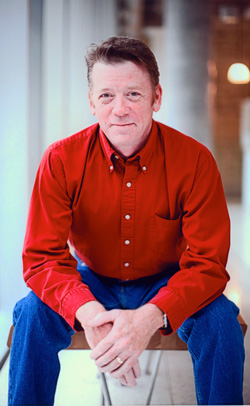Meet Paul E. Fraser
In 2011, at the University of Toronto became an associate editor for the . Before becoming an associate editor, Fraser served as an editorial board member for the JBC for more than eight years. An expert in neurodegenerative diseases, Fraser focuses on the biochemistry and biophysics of amyloid plaques and their connections to Alzheimer’s disease. Fraser has organized several conferences on amyloids and served on the editorial board of Biochemica Biophysica Acta. Fraser spoke with 91”įŅ‚Today about his research interests, his thoughts on the JBC and his career path. Below are edited excerpts from the interview.
 Tell us what your group works on.
Tell us what your group works on.
The focus of our work has been largely related to Alzheimer’s disease. We actually have a number of different avenues, like looking at the biochemistry and cell biology of gamma-secretase and presenilins. Back in 1995, I was privileged to be part of the team led by Peter St. George-Hyslop and Johanna Rohmmens that discovered and characterized presenilins. We had pulled out this interesting protein that turned out to be the major disease-causing protein in familial Alzheimer’s disease. Its gene was on chromosome 14. We later named the protein and its family members presenilins. Presenilins were considered to be the proteases responsible for chopping up the amyloid precursor protein. Mutations in the presenilins altered the proteolysis of APP.* When you have mutations in presenilins, the gamma-secretase becomes dysfunctional, APP tends to go astray and the disease accelerates. A lot of us are focusing on new diagnostics, whether it’s imaging techniques or biomarkers, so we can pick up people at risk for Alzheimer’s disease. We are looking at new proteins or genes that have been highlighted by genome-wide association studies [an approach that involves quickly scanning markers across sets of DNA, or genomes, from many people to find genetic variations in a disease]. These studies have pulled out half a dozen really interesting hits that are related to sporadic Alzheimer’s disease. We do a lot of basic protein chemistry as well as animal modeling. We’re not really techniques people, and my lab is more interested in focusing on the disease, so whatever tools we need, we work with them.
What has been your career trajectory?
I did an undergraduate degree at Dalhousie University. Then I did two years studying German in Germany. I’ve always been interested in brain research, so I followed up with graduate school in Toronto – first a master’s in 1984 and then a Ph.D. in 1988 – looking at the biochemistry of multiple sclerosis. I then did postgraduate work in multiple sclerosis at Harvard Medical School until early 1991. My backup project was in Alzheimer’s disease. It was an interesting time, because the gene for APP had just been cloned, and research into Alzheimer’s disease was exploding, particularly in Boston. By sheer coincidence, as I was finishing up my postdoctoral work, the [Centre for Research in Neurodegenerative Diseases at the University of Toronto] was setting up as a basic research institution funded by the Alzheimer Association of Ontario and donors such as Mark Tanz.** It worked out perfectly for me, because I fitted in with their mandate. My wife also was offered a partnership at a law firm [in Toronto], so it worked out rather well.
What was your reaction when you were asked to be an associate editor?
JBC is highly regarded in the neurodegenerative diseases field. I was incredibly honored to be asked. I was a little apprehensive about the commitment that’s involved! But I talked to Marty [Fedor, the JBC’s editor-in-chief] and Ken Neet [a JBC associate editor at the Rosalind Franklin University of Medicine and Science] and was convinced that it would be a great experience. It is a lot of work, but it’s actually enjoyable. I am finding I have much more contact with people. I also cover a whole range of topics that in the past I didn’t have the time to read up on. It’s certainly broadened my perspective.
What are your hobbies?
I do a lot of ocean sailing when I can. I have done a lot of sailing here on the Great Lakes. But I know some people who are sailing around the world, and I connect with them every once in a while. I’ve done a couple of trans-Atlantic [trips] and a really big trans-Pacific [one] from New Zealand to Argentina. It blew the whole December holiday, but it was fun!
What is your motto in life?
Try to be fair and just and treat people honestly.
Footnotes
*Presenilins are a family of transmembrane proteins that function as a part of the gamma-secretase protease complex.
** Tanz is a community leader who, after his mother’s death from Alzheimer’s disease in 1986, pledged millions of dollars to fund the Tanz Centre for Research in Neurodegenerative Diseases.
Enjoy reading 91”įŅ‚Today?
Become a member to receive the print edition four times a year and the digital edition monthly.
Learn moreGet the latest from 91”įŅ‚Today
Enter your email address, and we’ll send you a weekly email with recent articles, interviews and more.
Latest in People
People highlights or most popular articles

Fliesler wins scientific and ethical awards
He is being honored by the University at Buffalo and the American Oil Chemists' Society for his scientific achievements and ethical integrity.

Hope for a cure hangs on research
Amid drastic proposed cuts to biomedical research, rare disease families like Hailey Adkisson‚Äôs fight for survival and hope. Without funding, science can‚Äôt ‚Äúcatch up‚ÄĚ to help the patients who need it most.

Before we’ve lost what we can’t rebuild: Hope for prion disease
Sonia Vallabh and Eric Minikel, a husband-and-wife team racing to cure prion disease, helped develop ION717, an antisense oligonucleotide treatment now in clinical trials. Their mission is personal ‚ÄĒ and just getting started.


